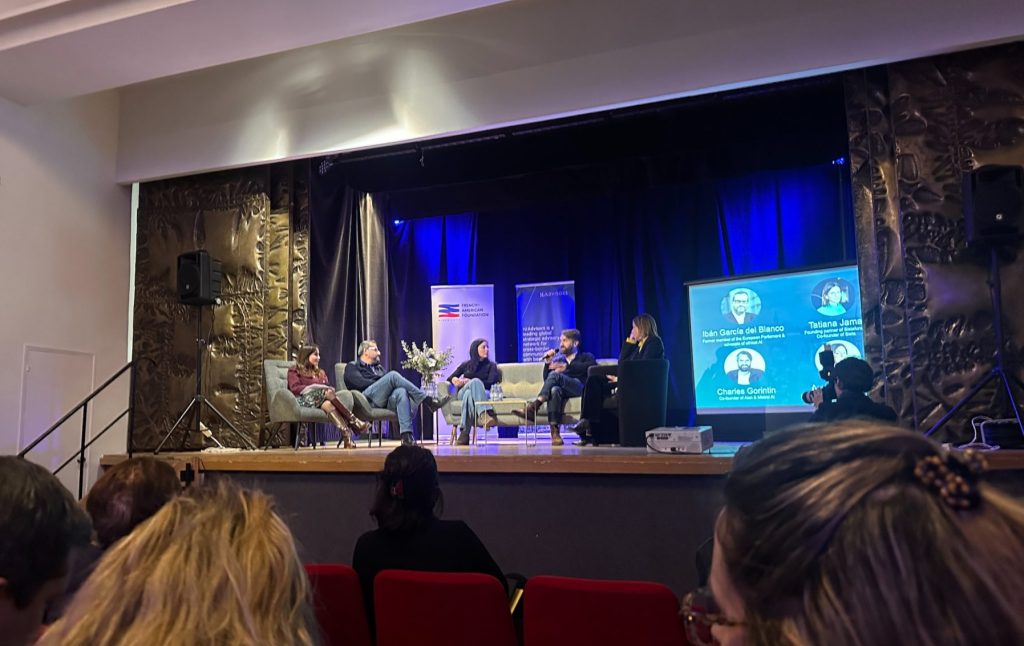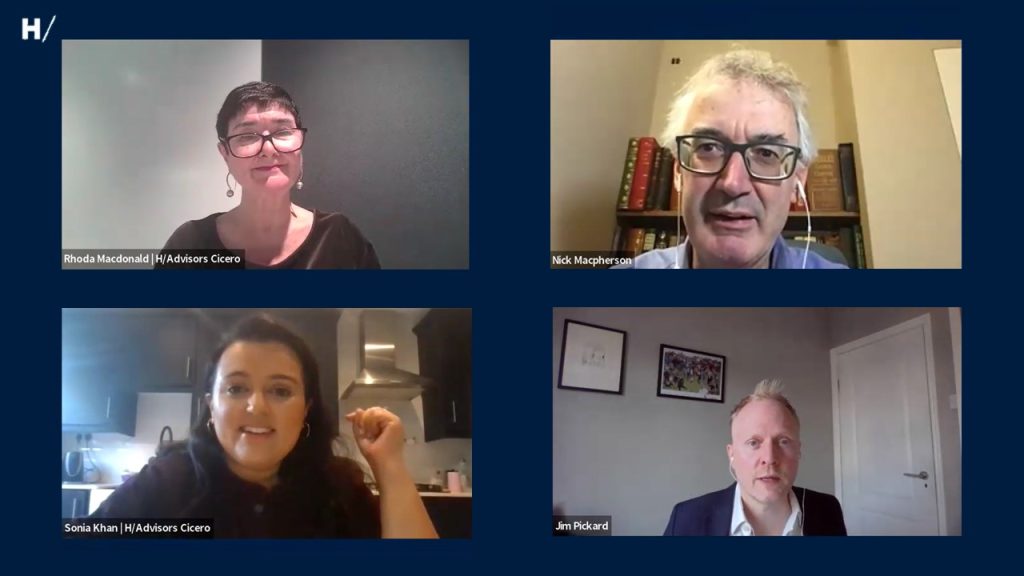Navigating the AI Maze: Echo Chambers, Fake News, and the Race for Regulation
7 February 2025
I had the pleasure of attending the H/Advisors and French-American Foundation event on AI in the age of democracy ahead of next week’s AI Summit in Paris. The panel, moderated by our very own Chris Wimpress, provided diverse thoughts on AI’s interaction with democratic process and the intersection between technological advances and the spread of “fake news”.
The Echo Chamber Effect: Are we part of the problem?
A recurring theme throughout the discussion was the challenge of echo chambers. It begs an uncomfortable question: even with the best intentions, do we actively seek out diverse perspectives? As comms professionals, our obligation is to scrutinise the news and engage with differing viewpoints. But the reality is, in our increasingly personalised digital world, it’s easier than ever to curate our information feeds, reinforcing existing biases and limiting our exposure to challenging ideas. For example, we all know that algorithms on social media platforms often prioritise content that aligns with our past behaviour, creating filter bubbles that reinforce our existing beliefs and limit our exposure to opposing viewpoints. How much are we, inadvertently, contributing to the polarisation of public discourse?
This question becomes even more pressing in the context of AI-powered fake news. Both panels highlighted the chilling reality that lies spread faster than truth – both on- and offline – a phenomenon amplified by AI’s ability to generate and disseminate misinformation at scale. The use of AI to create deepfakes and fabricate convincing narratives is genuinely scary, particularly because of their potential to manipulate public opinion, damage reputations, and even incite drastic views.
When inaccurate statements are made that resonate with a particular viewpoint and clips are quickly shared across platforms, it’s near impossible to change people’s minds. How can truth possibly compete with such a powerful and rapidly spreading fabrication? We all know it’s incredibly difficult to prove a negative. How do you definitively disprove a fabricated story that has already gone viral?
This leads to a broader crisis: are we even dealing in facts anymore? In a world where the proliferation of social media and online platforms allows anyone to share information, regardless of its veracity, separating fact from fiction feels increasingly impossible. The sheer volume of information, coupled with sophisticated manipulation techniques, makes it difficult for even the most discerning individuals to navigate the information landscape.

The AI Race: Geopolitics and the regulatory challenge
The discussion also turned to the geopolitical implications of AI development. The EU’s role as a potential “referee” in the AI race was a key focus. However, the rapid pace of technological advancement raises serious questions about regulatory agility. Can regulators keep up with the breakneck speed of AI development? Where is the talent pool that will drive innovation? Mistral‘s success in 2023, marked by significant funding and recognition for its innovative large language models, demonstrated the EU’s potential in the AI space. But where will the next breakthrough come from? Will the EU be able to foster a thriving AI ecosystem that can compete globally?
Comms’ role in the age of AI
The panel left us with more questions than answers, which is precisely the point. We are in uncharted territory, navigating a complex landscape where technological progress intersects with democratic values. As communication professionals, we have a crucial role to play in fostering informed public discourse, challenging misinformation, and demanding transparency and accountability in the development and deployment of AI. We must become more critical consumers of information, actively seek out diverse perspectives, and equip ourselves with the tools and knowledge necessary to identify and combat AI-powered manipulation. The future of democracy may well depend on it.
Chris Wimpress at the Town Hall of the 9th arrondissement; Chris and Alice in Paris
Get in touch with our communications team comms@cicero-group.com
UPDATED: February 2025
The Chancellor’s 29 January speech on her plans for supply-side stimulus doubled as another opportunity to reset the Government’s public narrative. That desire for another reset is reflected in recent changes to Special Advisers across the frontbench. The areas that have been bolstered are telling. While the headline addition to the list of Special Advisers was Olaf Henricson-Bell (brother of new Pensions Minister Torsten Bell) as Head of No 10’s Policy Unit, there’s a lot that the other new appointees can tell you about the areas of focus. Namely, communications, communities, and policy.
The introduction of Jason Keen and Abby Tomlinson (of Milifandom fame) to the No.10 media operation suggests a need to address perceived communications weaknesses. Keen brings with him years of media and communications experience, from his half a decade as a producer at the BBC and later as an adviser to the Duke and Duchess of Wessex. He will undoubtedly be tasked with communicating the Government’s “Plan for Change” (a message that according to recent YouGov polling is not successfully cutting through).
Tomlinson cut her teeth leading the Milifandom movement in 2015 at just 17 years old. Prior to taking on the role in No.10, Tomlinson worked as Labour’s Acting Head of Digital and had spent two years as a Digital Content Manager for the party. Her role indicates a need to engage with an increasingly online general public, where both older and younger voters are being drawn towards the political fringes.
On the policy side, alongside Henricson-Bell, recent No.10 SpAd appointments have fallen into two buckets. Liz Lloyd and Alex Roycroft joined No.10 as Special Advisers for Policy Delivery and Innovation, and Legislation respectively. The need to deliver clear, effective policy that progresses quickly through Parliament is something that every government aims to achieve, but these new hires suggest a renewed focus on this goal. Outside of policy creation and delivery, James Carroll and Joy Johnston joined as Special Advisers for Partnership, and Faith, Communities and Civil Society. James Carroll’s Partnership role has already seen him organise webinars and meetings between key stakeholders and Ministers. Joy Johnston’s background as public servant at the Home Office and National Crime Agency will put her in good stead to help the Government respond to the events surrounding last year’s Southport attacks.
Our updated H/Advisors Cicero Special Adviser Map lists the newest special advisers in departments across the Government, including the key advisers in No 10.
Special Advisers (SpAds) are there to help their Minister communicate their key messages, amplify their successes and get the most out of their Department’s civil servants, e.g. through supporting and providing direction to teams working on high-priority or political sensitive topics.
To download our updated SpAd Map, please enter your details below:
The real test of the Starmer Government
Former Deputy Prime Minister, and H/Advisors Cicero Senior Counsel, Sir David Lidington, shares his views on the key domestic and international challenges facing Keir Starmer’s Government in 2025.
This is an extract from Sir David’s full analysis provided to H/Advisors Cicero clients.
As we enter the new year, Keir Starmer and his revamped Number 10 team see three goals as essential to their hopes of reelection in 2028 or 2029: rising living standards; improved NHS services, and effective controls on immigration.
As President Joe Biden’s record shows, it won’t be enough for official statistics to improve – changes must be ones that voters notice. Starmer and Rachel Reeves are pinning their hopes on higher economic growth, but the chances of that depend significantly on international developments. 2025 will mark the real test of the Starmer Government. Voters will expect to start to see progress on some of the main stated goals of the Labour Government and have the opportunity to punish them at the ballot box if they aren’t satisfied.
Health and homes
- Building back better With growth forecasts for 2025 dire and business confidence low, the Government is pinning its hopes for growth on a major reform of planning and a massive construction programme. But it’s hard to see this having much material impact before 2026.
- A healthy start to 2025 With the NHS, the test will be whether Wes Streeting is allowed by his Cabinet and Party colleagues to get serious about reform and whether he (and Starmer) have the skill and political steel to drive Whitehall and NHS leaders to deliver what they want.

Boats and ballots
- The boat that stopped On immigration, 2025 will see Starmer continuing to adopt hard-line language and efforts, both bilaterally and in conjunction with other European countries, to negotiate return agreements for both unlawful immigrants and foreign prisoners.
- Back at the ballot box Local elections in May 2025 will be the first big electoral test since the General Election.

The international economic scene
- While challenges mount at home, Starmer can’t expect international relations to be smooth sailing either. Donald Trump’s Presidency offers major risks, but also potential opportunities for the British Government.
Climate and conflict
- Things can only get hotter For Starmer, alignment with the EU Climate Border Adjustment Mechanism represents low-hanging fruit in his efforts to “re-set” UK/EU relations.
- War and peace In the event of a truce in Ukraine, there are strong rumours that Trump will demand, as a condition for continuing US commitment to NATO, that the Alliance set a target for defence spending of 5% of GDP for every ally.

Reasons to be cheerful
- Security and technology Starmer may use the close alignment of UK and US security interests to push for a bilateral or Five-Eyes pact to establish common regulatory standards and technology sharing arrangements on AI, quantum and other new technologies.
Speak to our Public Affairs team for further insights in 2025: ukpublicaffairs@h-advisors.global
In mid-November, the Chancellor Rachel Reeves will make her first Mansion House speech, outlining her “vision for the financial services sector”.
We invite you to join us for a webinar and quick Q&A the following day to hear our analysis of the speech and what it means for financial services businesses, with reactions from Iain Anderson, Executive Chairman and Dave Eaton, Associate Partner and Head of Financial Services Policy.
Date: Friday 15th November
Time: 9.30am – 10am
Zoom: Register via this link
In this short virtual session we will share their reactions to Rachel Reeves’ speech and answer questions from the audience.
The webinar will be chaired by Mairi Maclennan.
We were pleased to host The Telegraph’s Employment Editor Lucy Burton in November. She joined us in conversation with Adam Taylor to discuss how the team and desk works, how to pitch relevant stories and her own observations on business journalism and working with the PR industry.
For more information please get in touch with adam.f.taylor@h-advisors.global.
On Thursday 31 October at 8.30am we will be hosting a live webinar discussion and Q&A to reflect on the Chancellor Rachel Reeves’ first Budget with guest speakers confirmed so far:
- Baron Nick Macpherson of Earl’s Court (Crossbench Peer and Permanent Secretary to the Treasury 2005-2016)
- Jim Pickard (Deputy Political Editor, Financial Times)
- Sonia Khan (Partner, H/Advisors Cicero and former Treasury Special Advisor)
Chaired by Rhoda Macdonald (H/Advisors Cicero Senior Counsel).
We will hear analysis of the Budget the day before and what it might mean for business and the new Labour Government going forward.
To book your place on our webinar, please go to our Zoom registration page here.

